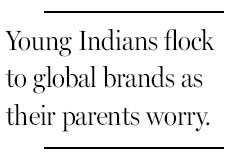Shops divide India by age
 |
|
Small family-owned businesses make up more than 90 percent of Indian retailing, but young women prefer malls. Prashanth Vishwanathan for The New York Times |
PATNA, India - A long-festering controversy about whether India should allow foreign retailers like Wal-Mart into the country has often been cast as a battle between millions of small shopkeepers and large corporate interests. But in much of the country, including in this eastern city, the issue often divides Indians as much by age as by their livelihoods.
Those younger than 25, a group that includes about half the country's 1.2 billion people, appear quite open and eager to try foreign brands and shopping experiences, researchers say. They already while away their afternoons at Western-style malls like the year-old P&M Mall here where they try on T-shirts by Benetton, eat pizza from Domino's and watch movies in a Mexican-owned theater chain, Cinepolis.
Aakash Singh, a 20-year-old college student who recently came to the mall one afternoon, summed up his generation's attitude toward foreign retailers this way: "Absolutely, they should come. The country will benefit."
But many older Indians who came of age in an earlier era of socialist policies say they are not entirely comfortable with the idea of big-box stores and sprawling malls. They worry that foreign companies will siphon profits and business from Indian competitors, forcing millions of family-owned shops to close.
Isahak Sanatan, 34, counts himself a member of that worried generation even though he has worked for foreign telecommunications companies for most of his career. "Why are we allowing outsiders" into this industry, he asked during a recent visit to the mall. "The foreigners will take the profits out of the country."
So far, the older generation is prevailing. After years of debating the issue, Indian policy makers last month allowed big foreign chains like Wal-Mart and Tesco to set up stores in the country. But each of the country's 29 state governments was granted the ability to forbid foreign-owned outlets in their territories.
Leaders of most Indian states, including Bihar, of which Patna is the capital, have said they will not allow foreign retail outlets to operate within their borders. Companies like Benetton and Domino's that sell goods under a single brand or through franchisees had already been free to set up stores with Indian partners.
Analysts say the opposition from many politicians reflects the fact that the median age of Indian ministers is 65, compared with 25 for the general population.The young have so far been less likely than their parents to vote, so their strength in numbers has not yet compelled policy makers to pay much heed to them.
Still, the government of Prime Minister Manmohan Singh appears to be counting on their support. Last month, Mr. Singh invoked the benefits of accepting foreign retailers for the young in a rare address to the country to defend the change in policy.
"Foreign companies are creating jobs for our youth - in information technology, in steel and in the auto industry," he said. "I am sure this will happen in retail trade as well."

More than 90 percent of India's $500 billion retail industry is still dominated by small family-owned stores. Young Indians do not yet have as much purchasing power as their parents, for one thing, though because many live with their families they often have disposable income to spend on goods like clothes and cellphones.
But Indians ages 16 to 23, who already account for a quarter of the spending on clothing and 16 percent of spending in restaurants in India's 50 biggest cities, tend to spend more money in modern retail stores and on foreign brands than their parents.
"This is a segment that will flourish over the years because there are so many young people," said Saloni Nangia, president of Technopak, a research and consulting firm. "A lot of people are taking part-time jobs or are working so that gives them a lot more disposable income."
The growth has been particularly strong in smaller cities like Patna. The P&M Mall, owned by a Bihari film director and producer, Prakash Jha, and the foreign-brand stores in it like Puma and Nike are a source of pride to many city residents. Benetton, the Italian clothing chain, has two franchised stores in the mall.
Many in the older generation say that while they are not entirely comfortable with the move toward modern stores and foreign brands, they think little can be done to reverse the tide.
Anant Kumar Sinha, who owns a cloth store about a 10-minute drive from the mall, says most young people are not interested in buying cloth and taking it to a tailor. His sales have been stagnant.
"The kids of the poor are also wearing jeans and T-shirts," he said. "The new generation does not care about the way it was done before."
The New York Times


















